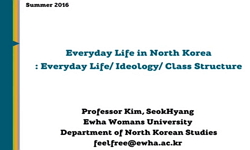Civil society’s participation in state affairs helped the Korean government strengthen its capacity to reform big businesses, the economic bureaucracy, and the legislature. The KDJ and RMH governments reformed the central bureaucracy and market by m...
http://chineseinput.net/에서 pinyin(병음)방식으로 중국어를 변환할 수 있습니다.
변환된 중국어를 복사하여 사용하시면 됩니다.
- 中文 을 입력하시려면 zhongwen을 입력하시고 space를누르시면됩니다.
- 北京 을 입력하시려면 beijing을 입력하시고 space를 누르시면 됩니다.
https://www.riss.kr/link?id=A104866348
- 저자
- 발행기관
- 학술지명
- 권호사항
-
발행연도
2009
-
작성언어
English
- 주제어
-
등재정보
KCI등재,SSCI,SCOPUS
-
자료형태
학술저널
-
수록면
461-493(33쪽)
-
KCI 피인용횟수
5
- 제공처
-
0
상세조회 -
0
다운로드
부가정보
다국어 초록 (Multilingual Abstract)
government strengthen its capacity to reform big businesses,
the economic bureaucracy, and the legislature. The KDJ and
RMH governments reformed the central bureaucracy and market
by mobilizing the whistle-blowing activities of civil organizations.
This study shows how a new pattern of regulatory state
was formed under a participatory democratic political environment
in Korea, while the government was forced by the IMF to
implement neoliberal economic reform. The regulatory state in
Korea shared core axioms with its Anglo-European counterparts
in many respects. Nevertheless, the differences between them are substantial and noteworthy. In particular, with regard
to the Korean case, the social movement-like participation of
civic organizations in the regulatory state is the most notable
feature.
Civil society’s participation in state affairs helped the Korean
government strengthen its capacity to reform big businesses,
the economic bureaucracy, and the legislature. The KDJ and
RMH governments reformed the central bureaucracy and market
by mobilizing the whistle-blowing activities of civil organizations.
This study shows how a new pattern of regulatory state
was formed under a participatory democratic political environment
in Korea, while the government was forced by the IMF to
implement neoliberal economic reform. The regulatory state in
Korea shared core axioms with its Anglo-European counterparts
in many respects. Nevertheless, the differences between them are substantial and noteworthy. In particular, with regard
to the Korean case, the social movement-like participation of
civic organizations in the regulatory state is the most notable
feature.
참고문헌 (Reference)
1 이연호, "한국에서 민주주의 심화가 조정국가(Regulatory State)의 변화에 미친 영향" 신아시아연구소 13 (13): 26-54, 2006
2 Lee, J., "“Shimin Danche e daehan Shilloido Jeungga” [Increase inthe Credibility on Civic Groups]" Shimin Sahoi Shinmun
3 Lee, K, "“Gongmuwon ui Jeungga” [Increase in GovernmentEmployees]" Yonhap News
4 Rhodes, R. A. W., "Understanding Governance: Policy Networks, Governance,Reflexivity, and Accountability" Buckingham: OpenUniversity Press 1997
5 Vishwanath, Tara, "Towards Transparency in Finance and Governance" Washington, D.C.: World Bank 1999
6 Lowe,Rodney, "The Welfare State in Britain since 1945" New York:Palgrave Macmillan 2005
7 Wilding, Paul, "The Welfare State and the Conservatives" 45 (45): 1997
8 T. J. Pempel, "The Politics of Asian Economic Crisis" Ithaca: Cornell University Press 1999
9 Koo, Hagen, "The Political Economy of Income Distribution inSouth Korea" 12 (12): 1984
10 Huber, Evelyne, "The Paradoxes of Contemporary Democracy" 29 (29): 1997
1 이연호, "한국에서 민주주의 심화가 조정국가(Regulatory State)의 변화에 미친 영향" 신아시아연구소 13 (13): 26-54, 2006
2 Lee, J., "“Shimin Danche e daehan Shilloido Jeungga” [Increase inthe Credibility on Civic Groups]" Shimin Sahoi Shinmun
3 Lee, K, "“Gongmuwon ui Jeungga” [Increase in GovernmentEmployees]" Yonhap News
4 Rhodes, R. A. W., "Understanding Governance: Policy Networks, Governance,Reflexivity, and Accountability" Buckingham: OpenUniversity Press 1997
5 Vishwanath, Tara, "Towards Transparency in Finance and Governance" Washington, D.C.: World Bank 1999
6 Lowe,Rodney, "The Welfare State in Britain since 1945" New York:Palgrave Macmillan 2005
7 Wilding, Paul, "The Welfare State and the Conservatives" 45 (45): 1997
8 T. J. Pempel, "The Politics of Asian Economic Crisis" Ithaca: Cornell University Press 1999
9 Koo, Hagen, "The Political Economy of Income Distribution inSouth Korea" 12 (12): 1984
10 Huber, Evelyne, "The Paradoxes of Contemporary Democracy" 29 (29): 1997
11 Pirie, Iain, "The New Korean State" 10 (10): 2005
12 Kavanagh, Dennis, "The Major Effect" London:Macmillan 1994
13 Kim, Jun Ki, "The Growth of the Non-Government Sector in Koreaand Its Relations with the State" 2000
14 Gamble,Andrew, "The Free Economy and the Strong State:The Politics of Thatcherism" Durham: Duke Universit 1988
15 "The Bank of Korea Act" The Bank of Korea
16 East Asia Institute (EAI), "Survey on Social Credibility" East Asia Institute (EAI)
17 Katzenstein,Peter J, "Small States in World Markets" Ithaca: CornellUniversity Press 1985
18 Moran, Michael, "Rise of the Regulatory State in Britain" 54 (54): 2001
19 Choi, Jin-Wook, "Regulatory Forbearance and Financial Crisis inSouth Korea" 42 (42): 2002
20 Majone, Giandomenico, "Regulating Europe" London: Routledge 1996
21 "Proportion of WelfareExpenditure Relative to National Finances" Ministry for Health, Welfare and Family Affairs
22 R. Robison, "Politics and Markets in the Wake of the Asian Crisis" London: Routledge 2000
23 Lee, Yeonho, "Participatory Democracy and Chaebol Regulation inKorea" 45 (45): 2005
24 Pateman,Carole, "Participation and Democratic Theory" London:Cambridge University Press 1970
25 "Number of PublicServants" Ministry of Public Administration and Security
26 Held,David, "Models of Democracy" Cambridge: Polity 1987
27 Johnson, Chalmers, "MITI and the Japanese Miracle: The Growth ofIndustrial Policy, 1925-1975" : Stanford UniversityPress 1982
28 Jho, Whasun, "Liberalization as a Development Strategy: NetworkGovernance in Korean Mobile Telecom Market" 20 (20): 2007
29 Citizens’ Coalition for Economic Justice (CCEJ), "History"
30 Lee, Yeonho, "Hankuk esoui Keumyung Gujo Kaehyuk kwa KyujeKukga ui Deungjang e kwahan Nonjaeng [Financial Reformand the Transformation of the State in Korea]" 36 (36): 2002
31 Jayasuriya, Kanishka, "Globalization and the Changing Architectureof the State: The Regulatory State and the Politics ofNegative Coordination" 8 (8): 2001
32 Majone, Giandomenico, "From the Positive to the Regulatory State" 17 (17): 1997
33 Vogel,Steven Kent,Freer Markets, "Freer Markets, More Rules" Ithaca: Cornell UniversityPress 1996
34 "Financial Supervisory Service, Yeoncha Bogoseo" 2006
35 Tsuru, Kotaro, "Finance and Growth: Some Theoretical Consideration,and a Review of the Empirical Literature,”" Paris: OECD 2000
36 "Fair Trade Commission, Baek Seo [White Paper]"
37 Moon, Chung-in, "Economic Crisis and Structural Reforms in South Korea:Assessments and Implication" Washington,D.C.: Economic Strategy Institute 2000
38 Lew, Seok Choon, "Chamyeo Yeondae Bogoseo [People’s Solidarity for Participatory Democracy(PSPD)Report]" Seoul: Jayu Kieobwon 2006
39 "Budget for Government Committees" Ministry of Planning and Budget
40 "Annual Statistics Report" Ministry of Public Administration and Security
41 "Activities" People’s Solidarity for Participatory Democracy (PSPD),
동일학술지(권/호) 다른 논문
-
North Korea’s Rocket and Nuclear Tests, 2009: A Threatening Pyongyang or an Afraid Pyongyang?
- 한국학술연구원
- TAN ER WIN
- 2009
- KCI등재,SSCI,SCOPUS
-
Political Implications of Candle Light Protests in South Korea
- 한국학술연구원
- 이현우
- 2009
- KCI등재,SSCI,SCOPUS
-
- 한국학술연구원
- 박용수
- 2009
- KCI등재,SSCI,SCOPUS
-
- 한국학술연구원
- 문상복
- 2009
- KCI등재,SSCI,SCOPUS
분석정보
인용정보 인용지수 설명보기
학술지 이력
| 연월일 | 이력구분 | 이력상세 | 등재구분 |
|---|---|---|---|
| 2023 | 평가예정 | 해외DB학술지평가 신청대상 (해외등재 학술지 평가) | |
| 2020-01-01 | 평가 | 등재학술지 유지 (해외등재 학술지 평가) |  |
| 2011-01-01 | 평가 | 등재학술지 유지 (등재유지) |  |
| 2009-01-01 | 평가 | SSCI 등재 (등재유지) |  |
| 2007-01-01 | 평가 | 등재학술지 유지 (등재유지) |  |
| 2004-01-01 | 평가 | 등재학술지 선정 (등재후보2차) |  |
| 2003-01-01 | 평가 | 등재후보 1차 PASS (등재후보1차) |  |
| 2001-07-01 | 평가 | 등재후보학술지 선정 (신규평가) |  |
학술지 인용정보
| 기준연도 | WOS-KCI 통합IF(2년) | KCIF(2년) | KCIF(3년) |
|---|---|---|---|
| 2016 | 0.24 | 0.18 | 0.22 |
| KCIF(4년) | KCIF(5년) | 중심성지수(3년) | 즉시성지수 |
| 0.22 | 0.27 | 0.448 | 0 |






 KCI
KCI






